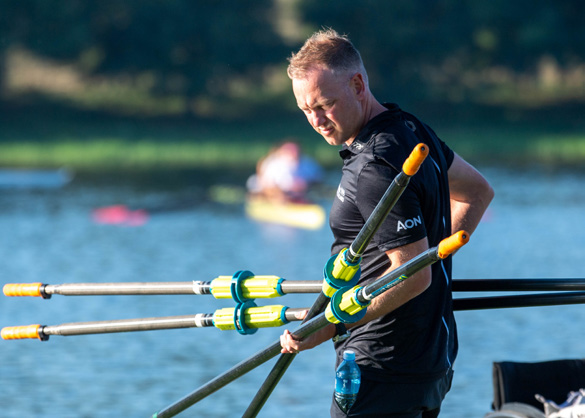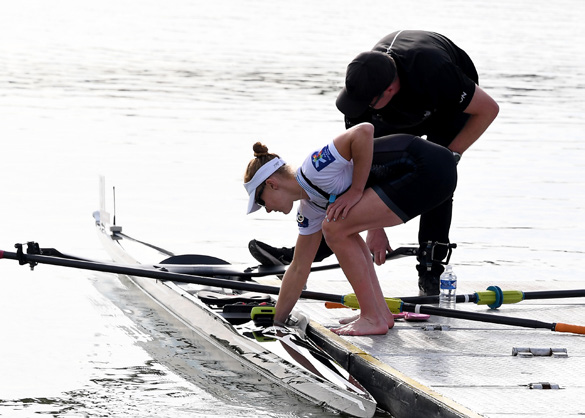James Coote
James Coote
- Coach Profile
James Coote is in the business of setting goals and achieving them.
“My ultimate goal was to coach for my country at a World Champs and Olympics,” he tells. “But I always knew it would be harder to be taken seriously, as I wasn’t an elite athlete myself.”
After taking the women’s double sculls crew to silver
at Tokyo, and having coached multiple crews to World Championship medals, he knows the winning feeling well. In a few months’ time, he will head off to his second Olympics in Paris, coaching the women’s double (Lucy Spoors and Brooke Francis) and lightweight women’s double (Jackie Kiddle and Shannon Cox).
Goal achieved? Technically, but leading into Paris, the goal is not just to coach at another Olympics, it’s to coach a crew to Olympic gold. “I fundamentally love rowing and everything about it – the time on the water, the way the boat moves, the equipment, the rhythm, the training, the people – but I also really love competing,” Coote says. “I very much enjoy working with high performing individuals, people who have a clear goal of what they want to do. I don’t like to lose, and
I don’t like the effect it has on athletes when they come up short. At this level, their livelihoods depend on it – if they don’t perform, they can lose funding and that can have a massive impact on them and their families. I take that pretty seriously.”
Coote’s love of rowing developed while at Takapuna Grammar, and the school had a good culture of senior and former students coaching novice rowers. After finishing school, while sometimes he’d jump in a club boat, coaching had piqued his interest. “I had some reasonable success, but mostly coaching was fun to be involved in, I was progressing, and I also felt like I was helping and having an impact on athletes.”
Like many young Kiwis, he was keen to see the world. Following a brief coaching stint in the United States, Coote found himself at some prestigious schools in the UK. “I would coach at Windsor Boys in the morning, then during the day build rowing boats for Eton College, coach again in the afternoon, and then head off to work in a bar until 1am,” he laughs.
Being in the UK made him realise just how big the sport was globally, and that coaching rowing could be a career move. After just a year abroad, he made the decision to come home and give coaching a real crack. Taking up the Director of Rowing role at his former high school, Coote pursued a tertiary qualification to support his coaching. During that time, crews he coached progressed through the levels,
from u18 to u21, to Junior World Championships. In 2010, Coote was appointed as a Regional Performance Coach with Rowing New Zealand, his first full time role with the national body.
Coote credits the High Performance Sport NZ Coach Accelerator Programme for giving him the skills to navigate through that challenge. “I truly believe I wouldn’t be an elite coach if I hadn’t been on the programme,” he says. “I didn’t know how much my own self-worth was wrapped up in the performance of my crews. If they didn’t perform, I was a crap coach and a crap person. I was working myself to the bone to get to what I thought was a good level of coaching.” He is full of praise for the coaches in his 2012-2014 cohort – Ian Wright (rowing), Scott McLeod (rugby), Ross Machejefski (cycling) and Gary Hurring (swimming) – for providing perspective
and skills to move past that. “Being able to separate my coaching and how the job is, to be present at home, and that it’s okay to do that, that was massive for me. It has been a turning point in my coaching.” Coote also credits Lyn Gunson, former Silver Ferns player and coach, for sharing her coaching expertise. “I’ve been lucky enough to have her working with me from my RPC days,” he says. “Her time, her advice, and her feedback have had a massive effect on my coaching growth and personal growth.”

Another experience he feels benefitted his coaching is becoming a parent. With two daughters, Maddie (8) and Charlotte (7), Coote has experienced the joys, stresses and sleeplessness that comes with newborns – knowledge that he can now apply to two of his current athletes. Lucy Spoors and Brooke Francis in the women’s double have returned
to the sport after having children, both of whom are now toddlers. “It’s something that really excites me,” Coote says. “I’ve known them for a long time, and they’ve seen me as a parent, and now I get to see that side of them too.”
While he is understanding that as primary caregivers the demands on new mums are often more than fathers, his own experience has made him sympathetic to how some days, it’s an achievement to just leave the house. Coote has enjoyed the challenge of building a programme around his two mum athletes. “Both of them want to be really great mums, and Olympic gold medallists,” he says. “So that’s what we’re working to achieve on both fronts. At the end of the day, we know which one comes first, but we all believe we can get the training done, we just need to find new ways of doing it.” Along with great family support, this looks like setting programmes that can be done at home on a rowing machine or bike, and critically, creating a safe, no-judgement space. “They’ve just been bombarded as new mums with questions, advice and doubts about what’s best for their child,” he says. “The quality of their sleep is impacted and the last thing they want is to be judged at rowing. We are flexible and fit it in around life, and because they both are
in the same position, there’s an understanding and trust between them, and having had kids, I get it too.”

When asked about career highlights, Coote looks to 2019 as his two crews, the lightweight double and heavyweight double, secured gold at the World Championships. But he’s also had his fair share of challenges along the way, including an athlete needing to retire for serious health reasons ahead of the Tokyo Olympics, leaving her partner unable to compete at the Games. “Working through all of that was a low moment,” Coote recalls. “I was acutely aware that this – rightly or wrongly – was everything to them, I knew how invested they were. It was harrowing to watch both go through some very personal struggles and end an amazing partnership, in the sense that you’re watching people who you have strong working relationships with go through such a challenge.” In what he regards as a massive achievement through that adversity, Jackie Kiddle has gone on to qualify in the same boat to head to Paris with a new partner in Shannon Cox.
Looking back on the various stages of his career, Coote recognises that one of the most integral parts was spending time with people in positions he aspired to. “I always tell my athletes that’s it’s not about preparing for the level they’re currently at, but also the level above that, and that’s been my philosophy in my own development too,” he says. “I drove from Auckland to Karapiro every Thursday for two years to ride along with Dick Tonks – it took about three months for him to talk to me,” he laughs, “but I’d observe him, and then we’d meet up and talk for a few more hours afterwards.” With similar gumption, he emailed Canadian biomechanist and author Volker Nolte for advice, and as luck would have it, Nolte had just decided upon a sabbatical in New Zealand and was happy to share his knowledge. “I’ve always been comfortable asking questions of elite coaches, because I didn’t have the reference of having been an elite athlete. I had to find a different way to immerse myself. So many mentors were generous with their time.”
And so that is his advice to those looking to advance their coaching career – seek out those who are where you want
to be. Not only within your sport, but those who understand what high performance is in other spaces too. “I’ve learned as much about performance from a top chef as I have talking to a sports coach,” Coote tells. “In their own words and terms, they opened up more about what high performance is. You still have to work on yourself, and know who you are as a coach, but other people have so much to offer.”
Ultimately, it’s his relationship with and responsibility to his athletes that drives him. Coote has to know within himself that he’s given his all to help his athletes achieve their goals. “We work as a partnership, and I like that at the end of the race, it’s the athletes in the boat park who hold me more accountable than anyone else. They’re who I’m accountable to, and I need to make sure I’ve done everything I can for them. That’s when I know I know I’ve done a good job.”